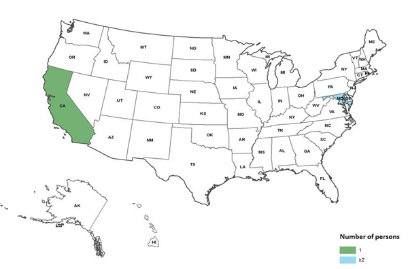The Centers for Disease Control and Prevention (CDC) has started an investigation into an outbreak of listeriosis, caused by the Listeria monocytogenes bacteria, in Maryland and California. One person in California was sick and died, and seven people are ill in Maryland. All seven people in Maryland have been hospitalized in this outbreak.

Five of the illnesses, two mother-newborn pairs and a newborn, were related to pregnancy. All of the patients are Hispanic. All patients in Maryland reported consuming soft or semi-soft Hispanic-style cheese and all shopped at different locations of the same food store. At this time, the CDC is identifying the store only as Chain A. Testing of cheese products collected from Chain A stores in Maryland and Virginia found the outbreak strain of bacteria.
The cheese is identified as Caujada en Terron (fresh cheese curd), produced by Roos Foods of Kenton, Delaware. That cheese was recalled on February 15, 2014, and consumer advisories and warnings about Roos cheese products were issued on February 19 and February 21, 2014. The cheese was repackaged in the Chain A store. Listeria monocytogenes was found in the cheese before it was repackaged. Pre-packaged cheese products at Chain A stores, by Roos Foods, have tested “preliminarily positive” for Listeria monocytogenes.
The FDA and state and local officials in Maryland and Virginia are investigating this outbreak as well. The FDA’s press release states that the Virginia Department of Health and Mental Hygiene found Listeria bacteria in a Roos Foods cheese sample collected at Mega Mart, a retail store in Manassas, Virginia. Roos Foods manufacturers cheeses under the brand names Santa Rosa de Lima, Amigo, Mexicana, Suyapa, La Chapina, and La Purisma Crema Nica brands. The government is advising consumers to avoid any cheese products made by Roos foods and to avoid any foods made with those cheeses.
Listeriosis is a serious illness caused by the Listeria monocytogenes bacteria. Anyone in a high risk category, including pregnant women, the elderly, and those with weakened immune systems, are more likely to experience a serious illness if infected.
Check your home for any of these products. If you have them, discard them or return them to the place of purchase for a refund. Listeria monocytogenes bacteria can grow at refrigerator temperatures, so keeping the cheeses refrigerated doesn’t help. In addition, if you purchased these products, clean and sterilize the refrigerator and any objects that may have come in contact with the cheese.
If you ate any of these products, monitor yourself for the symptoms of listeriosis for the next 70 days, because that’s how long it can take for symptoms to appear in this illness. Symptoms include headache, fever, stiffness, nausea, and vomiting. Pregnant women may have mild flu-like symptoms, but listeriosis can cause stillbirth and miscarriage.



